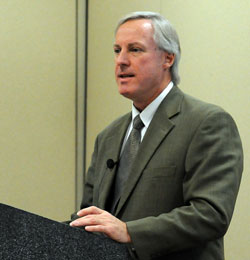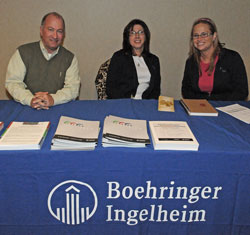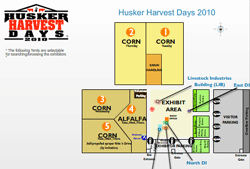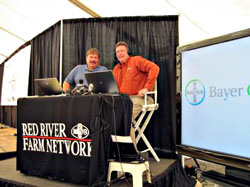 The Director of Swine Marketing for Boehringer Ingelheim Vetmedica is Randy Buller. He introduced attendees at their Swine Health Seminar to a brand new product, 3FLEX. Randy says the product will “revolutionize the vaccinating for the three most critical diseases in the swine industry.” He says 3FLEX will contain Ingelvac MycoFLEX, Ingelvac CircoFLEX and Ingelvac PRRS. It’s the first time the FDA has approved three vaccines to be used together in swine.
The Director of Swine Marketing for Boehringer Ingelheim Vetmedica is Randy Buller. He introduced attendees at their Swine Health Seminar to a brand new product, 3FLEX. Randy says the product will “revolutionize the vaccinating for the three most critical diseases in the swine industry.” He says 3FLEX will contain Ingelvac MycoFLEX, Ingelvac CircoFLEX and Ingelvac PRRS. It’s the first time the FDA has approved three vaccines to be used together in swine.
During today’s seminar our presenters will be discussing the research that has been done on this new product as well as ideas and suggestions for monitoring and diagnosing diseases in pigs. All the presenters will take part in a discussion panel after the presentations.
You can listen to my interview with Randy here: Randy Buller Interview
BIVI 2010 Swine Health Seminar Photo Album
The BIVI Swine Health Seminar is held in advance of the Allen D. Leman Swine Conference.


 Successful Farming® magazine was announced the Media Industry News (min) b2b Wow Award-winner at the Integrated Marketing Awards ceremony in New York City amongst more than 300 top-level media executives. The Wow Award is presented to the most innovative integrated marketing campaign or idea.
Successful Farming® magazine was announced the Media Industry News (min) b2b Wow Award-winner at the Integrated Marketing Awards ceremony in New York City amongst more than 300 top-level media executives. The Wow Award is presented to the most innovative integrated marketing campaign or idea. One of my upcoming stops on the agriblogging highway will be the U.S. Grains Council and Renewable Fuels Assocation,
One of my upcoming stops on the agriblogging highway will be the U.S. Grains Council and Renewable Fuels Assocation, 




